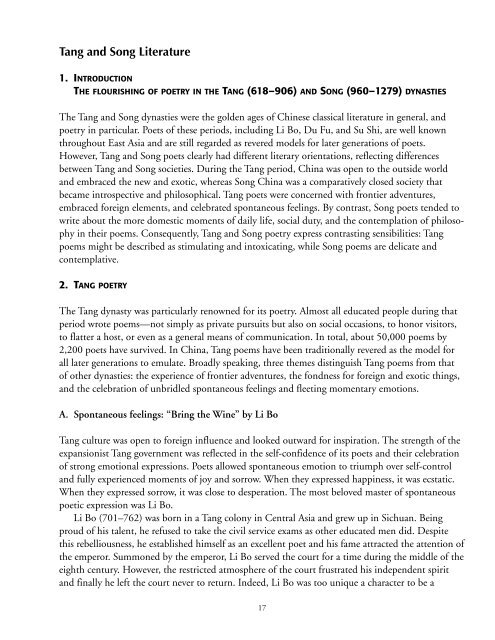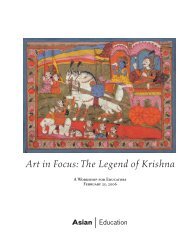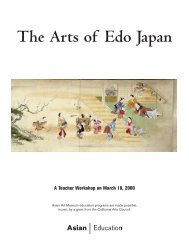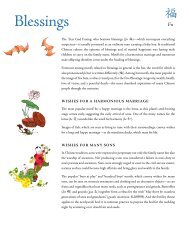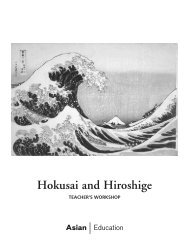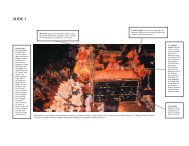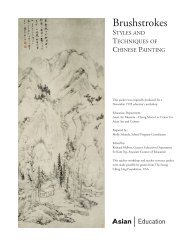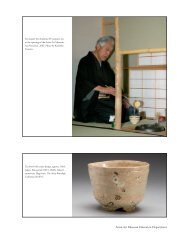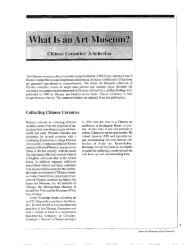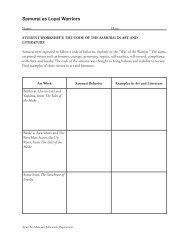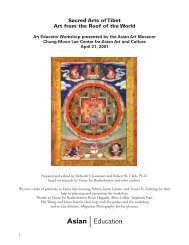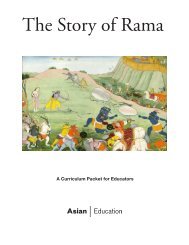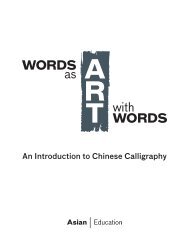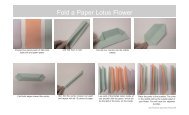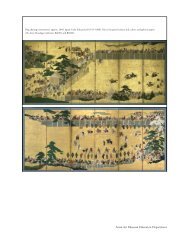China:The Glorious Tang And Song Dynasties - Asian Art Museum ...
China:The Glorious Tang And Song Dynasties - Asian Art Museum ...
China:The Glorious Tang And Song Dynasties - Asian Art Museum ...
Create successful ePaper yourself
Turn your PDF publications into a flip-book with our unique Google optimized e-Paper software.
<strong>Tang</strong> and <strong>Song</strong> Literature<br />
1. INTRODUCTION<br />
THE FLOURISHING OF POETRY IN THE TANG (618–906) AND SONG (960–1279) DYNASTIES<br />
<strong>The</strong> <strong>Tang</strong> and <strong>Song</strong> dynasties were the golden ages of Chinese classical literature in general, and<br />
poetry in particular. Poets of these periods, including Li Bo, Du Fu, and Su Shi, are well known<br />
throughout East Asia and are still regarded as revered models for later generations of poets.<br />
However, <strong>Tang</strong> and <strong>Song</strong> poets clearly had different literary orientations, reflecting differences<br />
between <strong>Tang</strong> and <strong>Song</strong> societies. During the <strong>Tang</strong> period, <strong>China</strong> was open to the outside world<br />
and embraced the new and exotic, whereas <strong>Song</strong> <strong>China</strong> was a comparatively closed society that<br />
became introspective and philosophical. <strong>Tang</strong> poets were concerned with frontier adventures,<br />
embraced foreign elements, and celebrated spontaneous feelings. By contrast, <strong>Song</strong> poets tended to<br />
write about the more domestic moments of daily life, social duty, and the contemplation of philosophy<br />
in their poems. Consequently, <strong>Tang</strong> and <strong>Song</strong> poetry express contrasting sensibilities: <strong>Tang</strong><br />
poems might be described as stimulating and intoxicating, while <strong>Song</strong> poems are delicate and<br />
contemplative.<br />
2. TANG POETRY<br />
<strong>The</strong> <strong>Tang</strong> dynasty was particularly renowned for its poetry. Almost all educated people during that<br />
period wrote poems—not simply as private pursuits but also on social occasions, to honor visitors,<br />
to flatter a host, or even as a general means of communication. In total, about 50,000 poems by<br />
2,200 poets have survived. In <strong>China</strong>, <strong>Tang</strong> poems have been traditionally revered as the model for<br />
all later generations to emulate. Broadly speaking, three themes distinguish <strong>Tang</strong> poems from that<br />
of other dynasties: the experience of frontier adventures, the fondness for foreign and exotic things,<br />
and the celebration of unbridled spontaneous feelings and fleeting momentary emotions.<br />
A. Spontaneous feelings: “Bring the Wine” by Li Bo<br />
<strong>Tang</strong> culture was open to foreign influence and looked outward for inspiration. <strong>The</strong> strength of the<br />
expansionist <strong>Tang</strong> government was reflected in the self-confidence of its poets and their celebration<br />
of strong emotional expressions. Poets allowed spontaneous emotion to triumph over self-control<br />
and fully experienced moments of joy and sorrow. When they expressed happiness, it was ecstatic.<br />
When they expressed sorrow, it was close to desperation. <strong>The</strong> most beloved master of spontaneous<br />
poetic expression was Li Bo.<br />
Li Bo (701–762) was born in a <strong>Tang</strong> colony in Central Asia and grew up in Sichuan. Being<br />
proud of his talent, he refused to take the civil service exams as other educated men did. Despite<br />
this rebelliousness, he established himself as an excellent poet and his fame attracted the attention of<br />
the emperor. Summoned by the emperor, Li Bo served the court for a time during the middle of the<br />
eighth century. However, the restricted atmosphere of the court frustrated his independent spirit<br />
and finally he left the court never to return. Indeed, Li Bo was too unique a character to be a<br />
17


